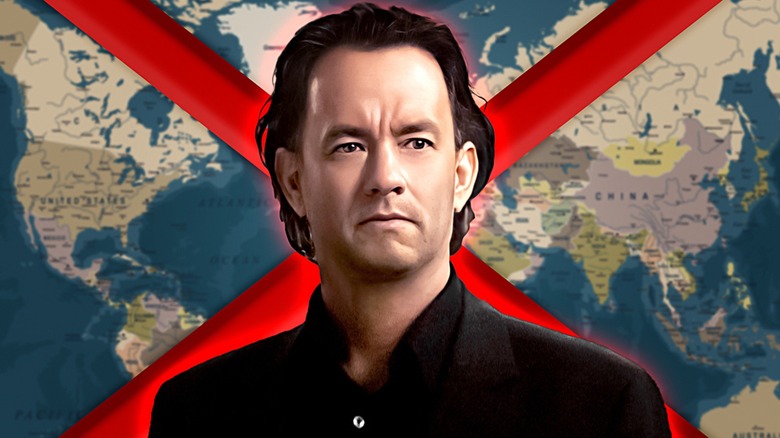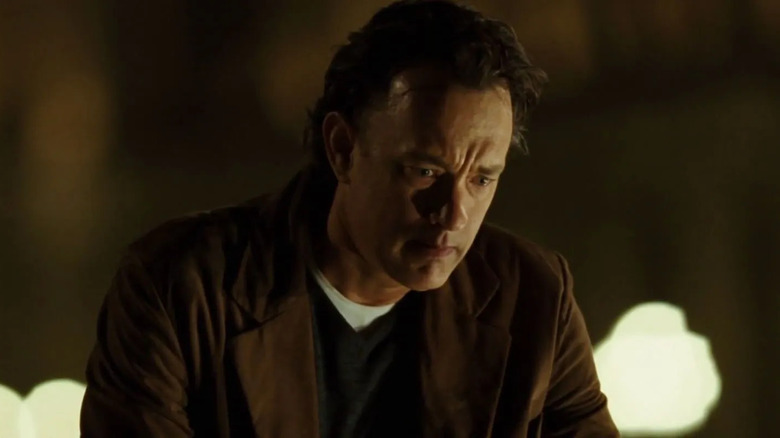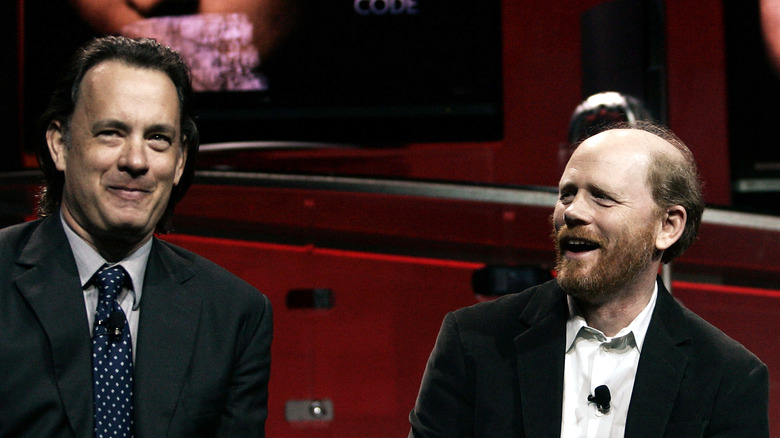One Of Tom Hanks' Biggest Movies Is Banned In Multiple Countries - Here's Why
In an era where movie stars are a dying breed, Tom Hanks is still a major draw. To date, the actor's films have amassed over $11 billion at the global box office. A cinematic presence for over four decades, Hanks' highest-grossing live-action film is still 2006's "The Da Vinci Code." An adaptation of the New York Times best-selling Dan Brown novel, the Ron Howard-directed picture grossed a whopping $767 million worldwide, with over $550 million coming from international markets. The thriller could have made a lot more if it wasn't banned in several markets for its narrative, which some countries and groups found blasphemous.
The film was banned in several regions because of its central mystery, or, rather, conspiracy, which suggests that the Catholic church is responsible for lying about the true status of Jesus Christ's lineage and his relationship with Mary Magdalene. Both the book and its adaptation suggest a complicated, alternate, conspiracy-ladened history, which many historians and critics have deemed factually inaccurate. Those who the watch "The Da Vinci Code" twice will notice some of its inconsistencies and narrative conveniences.
"The Da Vinci Code" was notably banned in Middle Eastern countries like Jordan and Syria, where officials deemed the pic blasphemous, as it goes against the teachings and content of both the Bible and Qur'an. Other Muslim majority countries like Egypt, Lebanon, and Pakistan are some of the other nations that decided to give the blockbuster the boot. While the film and its source material investigate Jesus from a Christian point of view, Christ is considered a holy prophet for Muslims and is mentioned in the Qur'an.
There were several protests against The Da Vinci Code
When Dan Brown's novel debuted, it was an inescapable cultural phenomenon. Thanks in part to its controversial subject matter, the book has sold over 80 million copies, making it one of the best-selling texts of all time. Naturally, the IP received even more backlash when Tom Hanks joined the film adaptation. Amidst several bans in prominent regions, the pic was also on the receiving end of many protests, which largely criticized its controversial narrative.
A number of countries tried to have the film banned, though not all government organizations agreed. The film premiered in China and made a healthy chunk of change but was pulled after nearly three weeks due to intense uproar and protests from the Patriotic Catholic Association and several other individual Catholics. "Our view is that it should never have been released in the first place," a Patriotic Catholic Association spokesperson said, suggesting that "The Da Vinci Code" was responsible for causing social instability. In India, which has a prominent Christian and Muslim population, the film was banned in several states, though it was shown in others with the equivalent of an R rating. Prior to its cinematic release, several protestors in India stormed bookstores to stop sales of the novel.
There were also protests in several countries like Iran, Thailand, and Greece. Interestingly, the protests began even before the movie's marketing campaign started. A Roman Catholic nun protested the project while it was filming at a London cathedral.
The Da Vinci Code cast and crew reflect on the backlash
Based on the novel's success, "The Da Vinci Code" was a golden ticket for any studio, and Columbia Pictures jumped at the opportunity, roping in Ron Howard to helm the pic. Prior to the film's release, the Catholic institution Opus Dei (who are featured in the film) asked the "Beautiful Mind" director to add a disclaimer to the release, making it abundantly clear it is a work of fiction. Howard refused, telling The Los Angeles Times (via The Guardian) that, "Those characters in this work of fiction act and react on that premise. It's not theology. It's not history. To start off with a disclaimer ... spy thrillers don't start off with disclaimers."
While the film was a global success, it was a critical misfire, boasting a poor 25% critics score on Rotten Tomatoes. Tom Hanks even had a brutally honest take on "The Da Vinci Code" trilogy, positioning them as simple popcorn thrillers with elevated premises. During a press event at the Cannes Film Festival (via The Guardian), where the film debuted, Hanks said that audiences shouldn't take the pic so seriously. "I view this as a great opportunity to discuss and clarify one's own place in the universe and cosmos. This is a film that can spur a better understanding to the individual. It's not a documentary," the "Cast Away" actor said.
Loved Hanks' mystery thriller? Check out these 30 movies like "The Da Vinci Code" that you should watch next!


